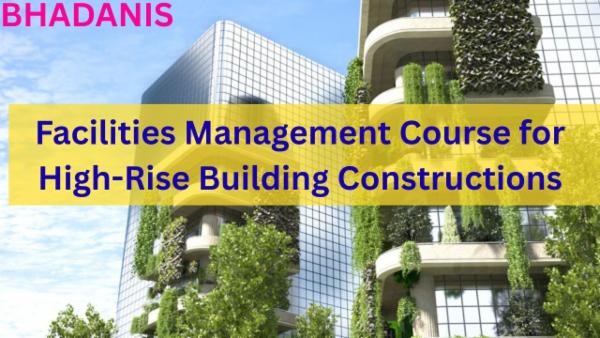There are no items in your cart
Add More
Add More
| Item Details | Price | ||
|---|---|---|---|
Facilities Management Course for High-Rise Building Constructions For Real Estate Professionals
Language: ENGLISH
Instructors: BHADANIS REAL ESTATE MANAGEMENT TRAINING INSTITUTE SINCE 2016
Validity Period: 365 days
Why this course?
Definition and scope of Facilities Management (FM)
Importance of FM in high-rise buildings
Roles and responsibilities of facility managers
Overview of high-rise building types and their unique FM challenges
Key stakeholders in facilities management
Trends and future outlook in FM for tall buildings
Mechanical, Electrical, and Plumbing (MEP) systems in high-rise buildings
HVAC systems: types, operation, and maintenance
Electrical systems: power distribution, backup, lighting control
Plumbing systems and water management
Fire protection and alarm systems
Vertical transportation systems: elevators and escalators
Types of maintenance: preventive, corrective, predictive
Maintenance scheduling and planning techniques
Maintenance work order management
Use of Computerized Maintenance Management Systems (CMMS)
Key Performance Indicators (KPIs) for maintenance
Case studies of maintenance failures and success
Occupational health and safety standards
Fire safety protocols and evacuation planning
Hazard identification and risk assessment
Environmental compliance and sustainability practices
Indoor air quality management
Emergency response planning and drills
Energy consumption patterns in high-rise buildings
Energy efficiency strategies and best practices
Renewable energy integration (solar, wind, etc.)
Building automation and smart energy management systems
Green building certifications (LEED, IGBC, GRIHA)
Sustainable waste management and water conservation
Understanding building asset lifecycle
Asset inventory and condition assessment
Cost analysis and budgeting for asset replacement
Lifecycle costing models
Capital planning and asset renewal strategies
Documentation and record keeping for assets
Security threats and vulnerabilities in tall buildings
Access control systems and CCTV surveillance
Security personnel management and training
Visitor management systems
Cybersecurity in building automation and IoT devices
Coordination with local law enforcement and emergency services
Types of FM service contracts (cleaning, security, maintenance)
Vendor selection and procurement processes
Service Level Agreements (SLAs) and Key Performance Indicators (KPIs)
Contract negotiation and management best practices
Monitoring vendor performance and compliance
Conflict resolution and dispute management
Cleaning standards for different building zones
Specialized cleaning for façades, windows, and common areas
Waste segregation and disposal practices
Use of cleaning technologies and eco-friendly products
Scheduling and supervision of housekeeping staff
Health and safety in cleaning operations
Types of waste generated in high-rise buildings
Waste segregation, collection, and disposal methods
Recycling programs and waste reduction strategies
Handling hazardous and electronic waste
Regulatory compliance for waste management
Role of tenants and occupants in waste management
Understanding tenant needs and expectations
Communication and grievance handling
Facilities-related services: parking, concierge, mail, and delivery management
Event and common area management
Managing tenant move-ins and move-outs
Customer satisfaction measurement and improvement
Building Management Systems (BMS) overview
IoT applications in FM: sensors, smart meters, and automation
Data analytics and decision-making
Mobile FM apps and cloud-based platforms
Predictive maintenance using AI and machine learning
Cybersecurity considerations in building automation
Budget preparation and cost control
Operating expenses vs. capital expenses in FM
Cost recovery and chargeback models
Financial reporting and auditing
Procurement budgeting and vendor payments
Cost-saving strategies and ROI measurement
National and local building codes applicable to high-rise FM
Environmental regulations and standards
Labor laws and employee compliance
Fire and safety compliance audits
Insurance requirements and claims management
Documentation and audit trails for compliance
Smart buildings and digital twins
Integration of renewable energy and microgrids
Sustainable urban development and FM role
Use of drones and robotics in FM
Advances in material science affecting maintenance
Career development and professional certifications in FM
After successful purchase, this item would be added to your courses.You can access your courses in the following ways :
